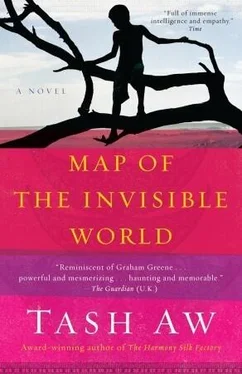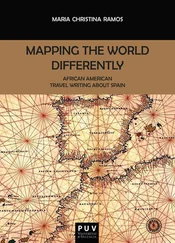Tash Aw - Map of the Invisible World
Здесь есть возможность читать онлайн «Tash Aw - Map of the Invisible World» — ознакомительный отрывок электронной книги совершенно бесплатно, а после прочтения отрывка купить полную версию. В некоторых случаях можно слушать аудио, скачать через торрент в формате fb2 и присутствует краткое содержание. Год выпуска: 2010, Издательство: Spiegel & Grau, Жанр: Современная проза, на английском языке. Описание произведения, (предисловие) а так же отзывы посетителей доступны на портале библиотеки ЛибКат.
- Название:Map of the Invisible World
- Автор:
- Издательство:Spiegel & Grau
- Жанр:
- Год:2010
- ISBN:нет данных
- Рейтинг книги:4 / 5. Голосов: 1
-
Избранное:Добавить в избранное
- Отзывы:
-
Ваша оценка:
- 80
- 1
- 2
- 3
- 4
- 5
Map of the Invisible World: краткое содержание, описание и аннотация
Предлагаем к чтению аннотацию, описание, краткое содержание или предисловие (зависит от того, что написал сам автор книги «Map of the Invisible World»). Если вы не нашли необходимую информацию о книге — напишите в комментариях, мы постараемся отыскать её.
comes an enthralling novel that evokes an exotic yet turbulent place and time—1960s Indonesia during President Sukarno’s drive to purge the country of its colonial past. A page-turning story,
follows the journeys of two brothers and an American woman who are indelibly marked by the past — and swept up in the tides of history.
Map of the Invisible World — читать онлайн ознакомительный отрывок
Ниже представлен текст книги, разбитый по страницам. Система сохранения места последней прочитанной страницы, позволяет с удобством читать онлайн бесплатно книгу «Map of the Invisible World», без необходимости каждый раз заново искать на чём Вы остановились. Поставьте закладку, и сможете в любой момент перейти на страницу, на которой закончили чтение.
Интервал:
Закладка:
“They’re quite excitable, aren’t they?” he said.
“They’re only students,” Margaret said, marginally reassured by her own voice. This was so stupid, she thought to herself. She was apprehensive about approaching a group of students with banners and silly bands of cloth around their foreheads. She even recognized some of them: There, that one waving the stick, she’d given him private lessons in English and taught him to say “Good day, how do you do?” He was harmless. They all were. And yet the memory of the previous day’s riot was still vivid in her mind. The whiteness of her skin that stood out so completely in the sea of dark bodies, how she had been made to feel different — profoundly and utterly different — in this country for the first time in her life; her helplessness; her reliance on Bill, on other people, on chance — she could still feel all these things, and she was scared.
They paused in a narrow corridor behind a concrete stairwell that hid them from view.
“Won’t this make good copy?” Mick said, laughing. “I’m finally a real foreign correspondent in the danger zone.”
“Let’s not get carried away. It’s hardly the Bay of Pigs.”
Mick was just feeling for his imaginary cigarettes when someone came around the corner, walking very quickly, brushing past him.
“Sorry.” It was the girl they had seen earlier at the podium. She hurried along, not pausing to look back at them. Margaret recognized her as a member of the student council; she was certain she had seen Din talking to her on several occasions.
“Miss, hello, miss, excuse me,” Margaret called out, starting after her. The girl did not stop; she did not even turn around.
Mick took off after the girl, catching up with her after a few (surprisingly swift) strides. “Excuse us,” he said, catching her elbow. She drew away instinctively and looked up with a frown. Her eyes were dark, distracted, as if she did not understand where she was.
“Sorry,” she said, blinking, “I didn’t hear you. I’m rushing to get somewhere.”
“Is the protest over, then?” Margaret said. “I thought it was just warming up.”
The girl put her hand over one side of her brow to shield her eyes from the afternoon sun. The shadows that fell on her face accentuated her slim nose and shapely cheekbones. She blinked and rubbed her eye; she was very pretty, Margaret thought.
“Are you okay?” Mick asked.
“Yes, sorry,” she said, “just a speck of dust.”
“So you are abandoning the protest early.”
“That?” the girl said, looking vaguely in the direction of the main gates. “I don’t know how long that will last. I’ve done my speech, and now there’s something else urgent I need to attend to. I’m sorry, but I’m very late already.” Raising her eyebrows as if to excuse herself, she pointed over her shoulder, motioning to where the bicycles were kept, and Margaret noticed a stripe on her wrist, a band of light-colored skin that had been shielded from the sun by a wristwatch or a bracelet. Odd, thought Margaret, though she could not say exactly why she found this unusual.
“We were just wondering,” Margaret said, trying to sound firm, “if you knew the whereabouts of Maluddin Saidi. You might simply call him Din, as I do. You know, my assistant. He’s a research student. Do you know who I’m talking about? He serves on the student council, I think.”
The girl nodded. “Of course I know him. I’m sorry to tell you that Maluddin has been reported for suspected membership in extremist groups that use violence to promote their political views — if you can call such views ‘political.’ Actually, I’m not sorry to tell you this. He deserves it. Those people are just idiots, if you ask me.”
Margaret could usually tell where someone came from — their native region and level of society — but this girl was frustratingly elusive; she spoke fluently and without much of an accent. She reminded Margaret of those society girls one saw, the extravagantly dressed daughters of the burgeoning nouveau riche, educated in the States or Australia. At the same time, there was something of the shanties about her: the slight aggressiveness of her consonants, the confrontational way of speaking to someone in authority, the way she was nervously pulling at strands of her glossy black hair while trying to appear casual — all these things suggested to Margaret someone who belonged to the new-style socialist movement.
“You mean Din’s been dismissed? Just like that?” The idea of him being locked out of his own office, kept away from his books and typewriter — all the things that were important to him, that held the key to his future — made her angry.
“No,” said the girl, still squinting into the light and blinking with irritation (not because of the dust, Margaret thought, but because she was unhappy at being challenged). “For now he is merely suspended while the evidence against him is being considered. Of course we in the council will be pushing for his swift dismissal. The longer his type has any links to well-intentioned student activists, the worse it will be for everyone.”
“The worse it will be for you, you mean?” said Margaret. “I suppose it was you who reported Din to the authorities?”
The girl lifted her chin slightly — a scant millimeter’s change in the way she held her head; it would have been imperceptible to anyone but Margaret. “Of course,” she said. “It was my duty. We can’t take the risk of having someone violent in our midst. For Indonesia to progress, we need a pure, good-hearted revolution. I’m sure you agree.”
“You’re supposed to be his friend. I’ve seen you talking to him, laughing, having fun. I even wondered whether you were his girlfriend.”
The girl laughed. It came out as a snort, an artificial chuckle. “I wonder why you are so concerned about him. Evidently you are sufficiently concerned about his private life that you have taken to spying on him. Yet you don’t know him intimately, or else you would know about his violent ideals.”
Oh my god , thought Margaret, this girl is patronizing me. Margaret could not remember the last time anyone had spoken to her in this way.
“Yes,” the girl continued, “it’s a good idea to defend this poor, clever boy from the kampung . All he wants is to finish his doctorate and help Indonesia achieve justice and fairness. By making bombs. By taking men and women from their families in the middle of the night and making sure they never return.”
Mick cleared his throat and laughed heartily. “That’s not what Margaret meant, was it, Margaret?”
Margaret did not answer. She tried to hold the girl’s gaze but was unnerved by the coldness of the nearly black pupils that stared back at her without flinching. The girl had stopped blinking but her eyes were still red and moist, irritated by that speck of dust; it was as though she wanted to prove how easily she could withstand something that bothered her, how she could control her reflexes. It was something Asian women seemed to be able to do so easily, something Margaret had always been able to imitate; but now she could no longer do so. She knew she was displaying signs of irritation. Do not get flustered, Margaret Bates, do not back down.
“What’s your name?” Margaret asked, trying to sound calm.
“Zubaidah,” the girl said. “Most people know me as Z. It’s a nickname my parents gave me.” Her reply was even calmer than Margaret’s question.
“Ah, yes, Z of the famous revolutionary pamphlet. Hello, Z. I didn’t think you would be quite so innocent looking. I’d expected someone rougher.”
“That’s because you’re full of prejudices. I’m sorry, but I really am very late,” Z said, lifting her arm and turning her wrist in an instinctive motion; but there was no wristwatch there, and she looked up at Margaret again. “I don’t have time to stand around discussing this.”
Читать дальшеИнтервал:
Закладка:
Похожие книги на «Map of the Invisible World»
Представляем Вашему вниманию похожие книги на «Map of the Invisible World» списком для выбора. Мы отобрали схожую по названию и смыслу литературу в надежде предоставить читателям больше вариантов отыскать новые, интересные, ещё непрочитанные произведения.
Обсуждение, отзывы о книге «Map of the Invisible World» и просто собственные мнения читателей. Оставьте ваши комментарии, напишите, что Вы думаете о произведении, его смысле или главных героях. Укажите что конкретно понравилось, а что нет, и почему Вы так считаете.












